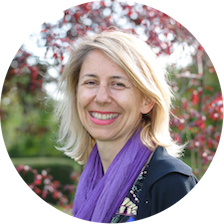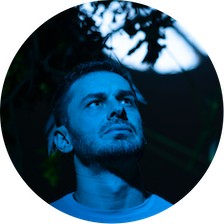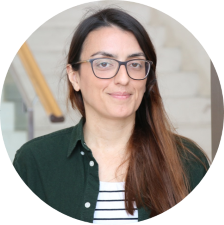Project description
Lament (2022 – 2024) is a new performance and installation belonging to my long-term project untaming death, which explores death from a more-than-human perspective in times of environmental disruption. In this context Lament focuses on the aftermath of wildfires, occurrences with complex ecological roles and with noxious effects on unbalanced ecologies. Stepping back from data-driven responses related to restoration and monitoring Lament embraces overlooked stories of transformations in post-wildfire environments along two trajectories: with a focus on soil and through community engagement.
Beyond the spectacular force of wildfires, Lament reflects on wildfires and the anthropogenic shifts in fire regimes by inquiring into more-than-human becoming in soil. These changes are unperceivable to humans, but possess far-reaching effects, capable of revealing regeneration and erosion. Extending the project to vulnerable communities, Lament offers engagement with those affected by wildfires to offer an entry to dealing with environmental tragedies and resilience. Equipped by the collaboration with leading environmentalists, conservationists and researchers, Lament makes space for the contemplation of ecologies of death and harnessing solastalgia and ecological grief as artistic and epistemological tools for the times to come.
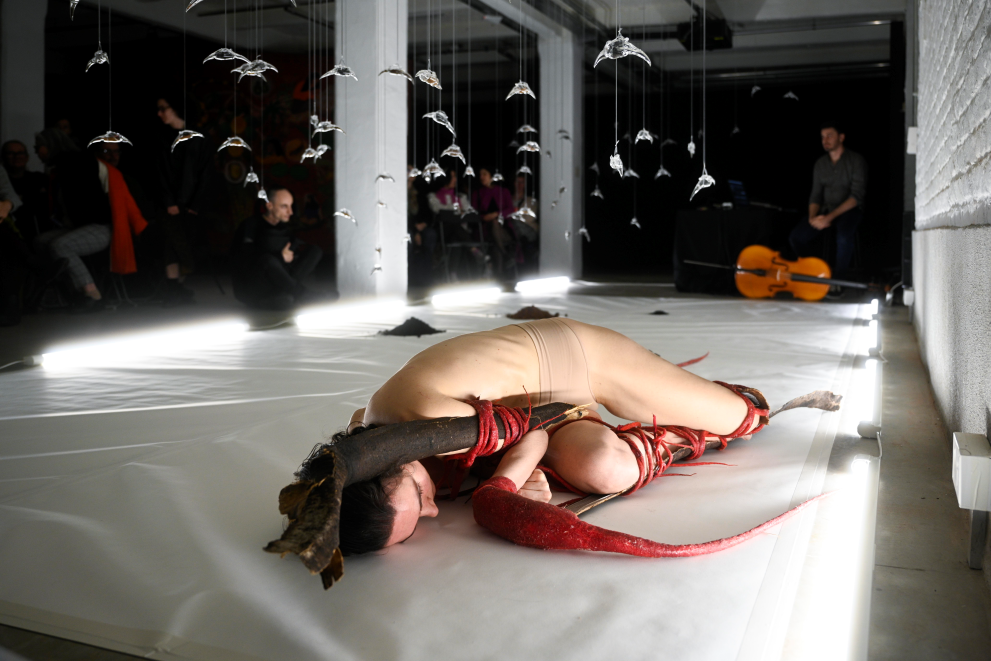
Performance: 40 mins performance for solo performer, cello and live electronics Installation: 4×7 m, glassware, rope, soil from burnt woods, paper. Community engagement program based on sensory mapping.
Lament website & performance trailer.
Margherita Pevere: concept, performance, installation, bio-protocols, costume and glassware design
Ivan Penov: music (composed and performed by)
Diana Viera / JRC: scientific advisor
Céline Charveriat / Pro(to)topia Consulting: research advisor
Lucía Iglesias Blanco / Nature Conservation Unit (DG for Environment, European Commission): conservation advisor
Jurica Mlinarec: project management
Lena Böckann: costume maker
Jason Hitchcock / Berlin Flameworking Studio, Berlin Glass: glassblowing
Caterina De Donato: studio assistant
Romane Iskaria: photography
Daniele Lucchini: video
Realised with the support of NaturArchy – Resonances Project at the Joint Research Centre of the European Commission
Special thanks to: Alfredo Branco, Daniele De Rigo, Margherita di Leo, Duarte Oom, Jesus San Miguel
Mattia Bianco, Marco Donnarumma, Mira Fabjan, Alessandro Ruggero, Gianmarco Lupi, Marco Revelant.
Céline Charveriat: concept and direction
Margherita Pevere: concept and artistic direction
Conceição Colaço / CEABN InBIO, School of Agriculture (ISA), University of Lisbon (UL): scientific advisor and project overview, partnership coordination
Brigite Botequim / CoLAB ForestWISE: Partnership coordination and resource supporter
André Mota / Santa Comba Dão Fire fighters: on-site support
Madalena Ferreira / CoLAB ForestWISE: on-site mediation
Letícia Oliviera / CEABN InBIO, ISA-UL: documentation
Tania Ricardo / Municipality of Santa Comba Dão: psychological support
With the hospitality of the municipality and the voluntary firefighters of Santa Comba Dão (PT), and the kind participation of its citizens.
Realised with the support of NaturArchy – Resonances Project at the Joint Research Centre of the European Commission, School of Agriculture (ISA) – University of Lisbon, CoLAB ForestWISE and FIRE RES – Innovative Technologies & socio-ecological-economic solutions for fire resilient territories in Europe.
Margherita Pevere is an artist and researcher whose inquiry hybridizes bio-technology, ecology, environmental politics, gender and death studies to create arresting installations and performances that trail today’s ecological complexity. Lucía Iglesias Blanco is a forestry engineer and a nature protection expert, at DG ENV. Former IEEP Director (Institute for European Environmental Policy), Céline Charveriat is a renowned research activist and experienced civil society leader. The three of them met at the SciArt Summer School on NaturArchy which took place in June 2022 at the JRC in Ispra. Margherita also involved artist and musician Ivan Penov in the project, who will contribute with sound recordings of burnt wood. They are also actively looking to work with experts from the JRC on wildfires. Since the residency periods at JRC, Margherita has also been working with Diana Vieira - an Environmental Engineer with a special focus on soil erosion risk, who has worked on burned areas and the underlying key-processes in fire-affected soils and landscapes to better adapt models to burned conditions.
What drives this project?
Lament looks at death ecologies after wildfires. Wildfires as one of the ecological phenomena or environmental phenomena that are part of ecosystem, but have been changing in the last decades because of anthropogenic environmental change - certain ecosystem are more prone to fire. So at a an ecological scale, how does death change meaning or implications in times of changing ecosystems? I started this project with the intention to give attention to the more than human implications of this process. So there's how to voice environmental grief, for instance, how to make space for solastalgia, how to make space for becomings after an environment has been dying.
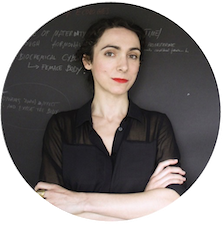
Margherita Pevere, Artist
My contribution to the project is very linked to the work I do at the Commission, so it's especially or in particular what Natura 2000 and the Natura 2000 network can bring to the project as it hosts very different type of ecosystems, including forests, that are being affected traditionally or more recently because of climate change by forest fires or wildfires. And I hope that Natura 2000 values, the Natura 2000 network and its processes, the importance of nature conservation, can reach also not only the artists, but the public and somehow let them get to know and feel proud about European nature and what is being done for its protection and for their benefit, so that they would want to take care of it.
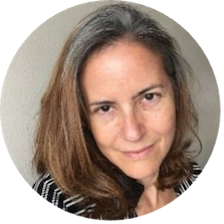
Lucia Iglesias Blanco, Policymaker

